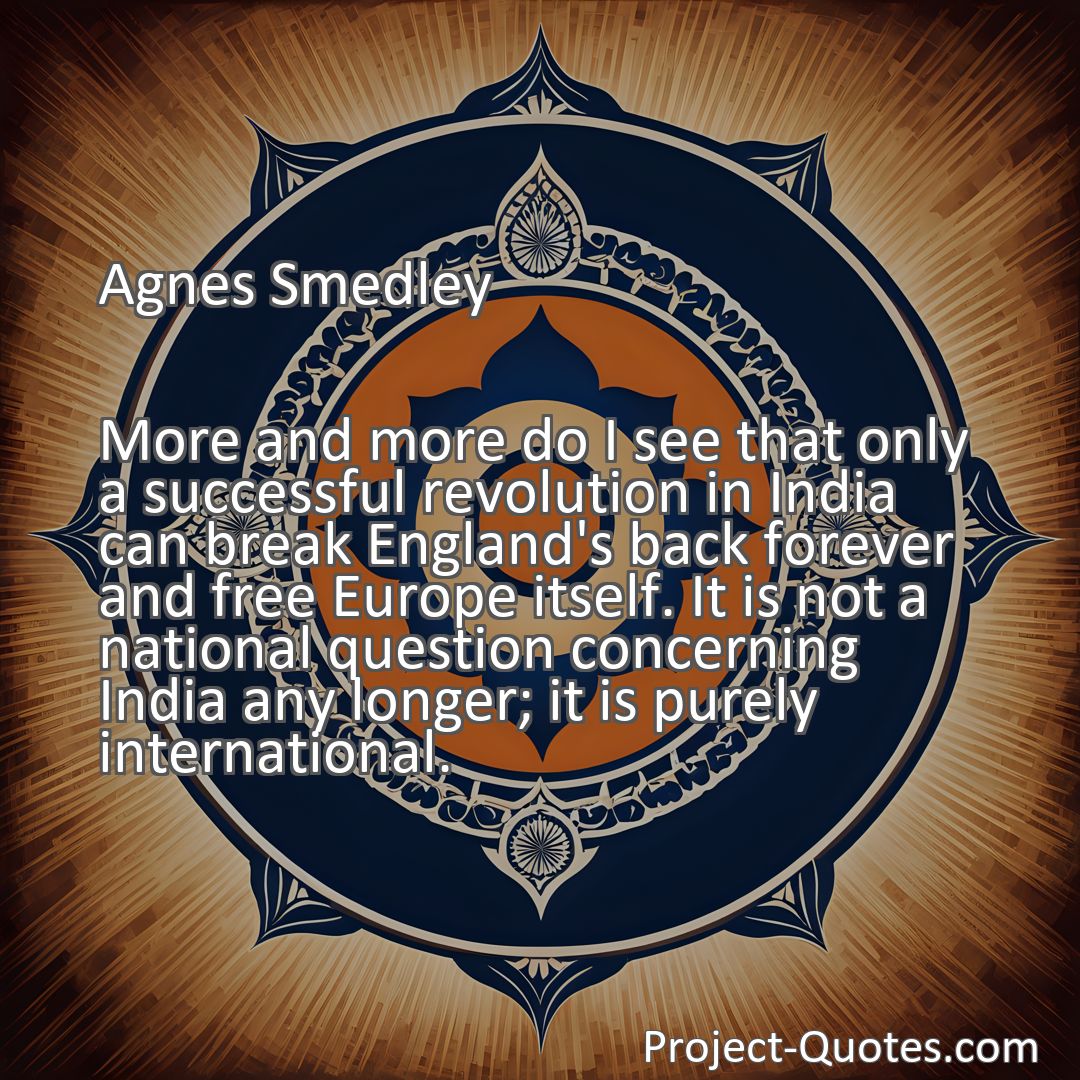More and more do I see that only a successful revolution in India can break England’s back forever and free Europe itself. It is not a national question concerning India any longer; it is purely international.
Agnes Smedley
The international significance of India’s revolution during British colonization is highlighted by notable figures like Mahatma Gandhi. Their leadership and advocacy for independence not only inspired the Indian people but also ignited a global movement against imperialism, ultimately challenging England’s hold on its colonies worldwide. Mahatma Gandhi’s role in India’s fight for freedom exemplifies the interconnectedness of nations and the influential power of individuals in shaping the course of history.
Table of Contents
- 1 More and more do I see that only a successful revolution in India can break England’s back forever and free Europe itself. It is not a national question concerning India any longer; it is purely international.
- 2 Agnes Smedley
- 3 Meaning of Quote – More and more do I see that only a successful revolution in India can break England’s back forever and free Europe itself. It is not a national question concerning India any longer; it is purely international.
- 4 Freely Shareable Quote Image
- 5 Related
Meaning of Quote – More and more do I see that only a successful revolution in India can break England’s back forever and free Europe itself. It is not a national question concerning India any longer; it is purely international.
In the famous words of Agnes Smedley, “More and more do I see that only a successful revolution in India can break England’s back forever and free Europe itself.” These words hold a remarkable significance as they shed light on the intricate dynamics between India and England during the time of British colonization. Smedley’s quote underscores the notion that the struggle for India’s independence transcended national boundaries, becoming an international affair with far-reaching consequences.
To truly grasp the weight of Smedley’s statement, we must delve into the historical context. It was in the early 20th century that India found itself under the oppressive grip of British rule. The British Empire had exerted control over the Indian subcontinent for nearly two centuries, exploiting its resources and subjecting its people to subjugation. However, during this time, the winds of change were starting to blow, not just in India, but across the world.
The early 1900s marked a period of burgeoning nationalistic movements and a rising tide of anti-colonial sentiment. In India, notable figures like Mahatma Gandhi and Jawaharlal Nehru began to emerge, spearheading the fight for freedom from British imperialism. It was against this backdrop that Smedley’s quote gained relevance and significance.
By highlighting the idea that India’s liberation was intertwined with the broader struggle for freedom in Europe, Smedley provided a profound insight. Indeed, the successful revolution in India had the potential to weaken England’s hold on its colonies worldwide, initiating a domino effect that could eventually free Europe from the clutches of imperialism.
At this point, it becomes essential to examine the reasons behind Smedley’s assertion of the international nature of India’s fight for independence. First and foremost, it is important to recognize that the British Empire was not limited to its territorial dominions; it had an extensive global presence. From Africa to Asia, England’s colonial rule was far-reaching, and any cracks in its imperialism could end up dismantling the vast network it had established.
Furthermore, the impact of India’s struggle extended beyond just the colonies under direct British control. The Indian independence movement functioned as a source of inspiration for oppressed peoples across the globe, demonstrating that resistance against colonial powers was not only possible but also necessary. The successful culmination of this movement would serve as a rallying cry for those yearning for liberation and fuel their own fights against imperialism.
Smedley’s quote also underscores the interconnectedness of nations and the shared aspirations for independence. The struggles faced by Indians under British rule echoed the sentiments of many populations suffering under similar conditions. By realizing the international implications of India’s revolution, Smedley rightly observed that its success would empower other nations to challenge their oppressors and emancipate themselves.
Moreover, the fight for India’s independence had significant international repercussions in terms of the ideological battle between imperialism and self-determination. The British Empire, once considered invincible, was being challenged by newly emerging forces advocating for decolonization. These forces, fueled by the desire for freedom, began to shift the global power balance, ushering in a new order that challenged the dominance of imperial powers.
The quote by Agnes Smedley takes us beyond India’s struggle for independence and invites us to contemplate the transformative power of revolutions. It serves as a reminder that a single event in one corner of the world can have far-reaching implications for the international community. As we reflect on Smedley’s words, we are compelled to recognize the interconnectedness of nations and the shared pursuit of justice and freedom.
In conclusion, Agnes Smedley’s powerful quote about the significance of a successful revolution in India encapsulates the complex dynamics of the fight for independence during the era of British colonization. By recognizing the international nature of this struggle, Smedley highlights the potential of India’s liberation to break England’s hold on its colonies worldwide and free Europe itself. This quote serves as a powerful reminder of the interconnectedness of nations, the shared aspirations for independence, and the impact that revolutions can have on the world stage.
I hope this quote inspired image brings you hope and peace. Share it with someone who needs it today!


